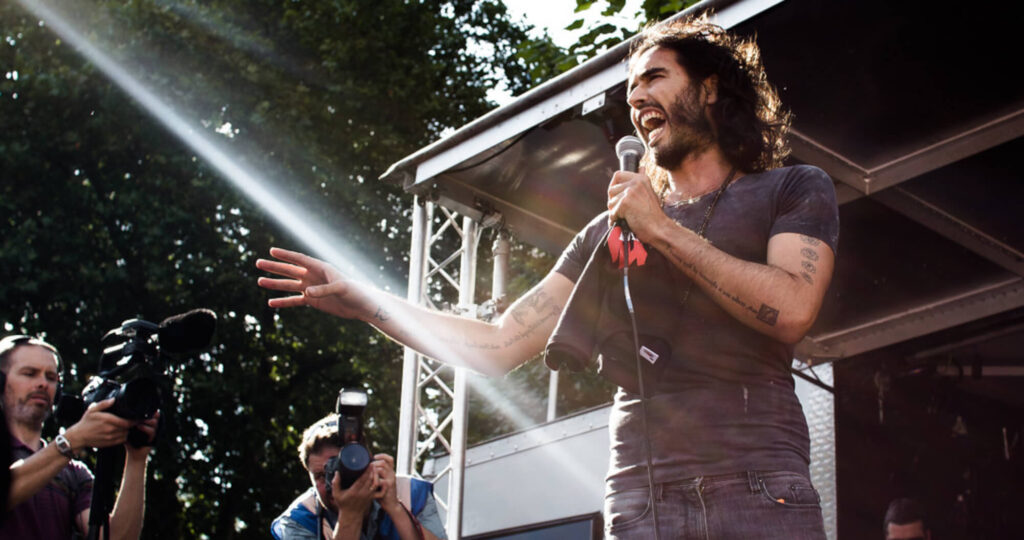The Importance of Cultural Sensitivity in Addiction Treatment

Russell Brand, a well-known comedian and author, has long been an advocate for understanding addiction through the lens of compassion and empathy. He emphasizes the importance of addressing the underlying emotional and psychological aspects that drive substance abuse. This perspective aligns with the idea that spiritual practices, such as prayer, can play a crucial role in addiction recovery.
The power of prayer in addiction recovery lies in its ability to connect individuals with a higher power, which can provide strength, guidance, and support throughout their recovery journey. By engaging in prayer, individuals can foster a sense of hope, resilience, and inner peace that can be invaluable in overcoming addiction.
 Many addiction recovery programs, such as the 12-Step program, emphasize the importance of connecting with a higher power as a key aspect of the recovery process. This connection can be deeply personal and does not necessarily need to align with any specific religious beliefs. Instead, it can be rooted in a broader sense of spirituality, personal growth, or an understanding of a greater purpose in life.
Many addiction recovery programs, such as the 12-Step program, emphasize the importance of connecting with a higher power as a key aspect of the recovery process. This connection can be deeply personal and does not necessarily need to align with any specific religious beliefs. Instead, it can be rooted in a broader sense of spirituality, personal growth, or an understanding of a greater purpose in life.
In the words of Russell Brand, “The mentality and behavior of drug addicts and alcoholics are wholly irrational until you understand that they are completely powerless over their addiction and, unless they have structured help, they have no hope.” Prayer can be a vital component of this structured help, offering individuals a way to tap into their inner strength and find solace during challenging times.
The power of prayer transcends cultural and religious boundaries, making it a valuable tool for individuals from diverse backgrounds seeking recovery from addiction. By incorporating prayer into their recovery journey, individuals can feel empowered to overcome their addiction and find lasting healing.
Uncovering some of the myths
Myth 1: Spirituality has no place in addiction recovery
Debunked: Spirituality can be an essential aspect of addiction recovery for many individuals. It can provide a sense of purpose, meaning, and support, which can be vital in overcoming addiction. Research shows that incorporating spirituality into recovery programs can lead to positive outcomes, including decreased substance use and increased feelings of well-being.
Myth 2: Prayer has no impact on mental health
Debunked: Several studies suggest that prayer can have a positive impact on mental health by reducing stress, anxiety, and depression. Prayer can also help individuals develop coping mechanisms, increase feelings of gratitude, and promote a sense of connection with a higher power or a supportive community.
Myth 3: The 12-Step program is religious and not suitable for non-religious individuals
Debunked: Although the 12-Step program does emphasize the concept of a Higher Power, it is not exclusively tied to any specific religion. The program encourages individuals to interpret the Higher Power concept in a way that aligns with their personal beliefs or spiritual framework. Many non-religious individuals have found success in 12-Step programs by focusing on broader spiritual principles or tapping into a sense of inner strength.
Myth 4: All religious and spiritual practices are the same in addiction recovery
Debunked: There is a wide variety of religious and spiritual practices that can support addiction recovery, and each person may find a different approach that resonates with them. Practices such as mindfulness, meditation, yoga, and prayer can offer unique benefits and help individuals connect with their spiritual side in distinct ways. It is essential to explore different practices and find the ones that best suit an individual’s needs and beliefs.
Myth 5: Prayer is only useful for religious people in managing stress and cravings
Debunked: Prayer can be a helpful tool in managing stress and coping with cravings, regardless of an individual’s religious beliefs. Prayer can help shift the focus away from negative thoughts and cravings by promoting relaxation, self-reflection, and connection with a higher power or a sense of inner strength. Even individuals who do not consider themselves religious can benefit from prayer or other meditative practices to help manage stress and cravings during recovery.
Addiction Recovery & Religion
While both different religious and spiritual practices and prayer can play significant roles in addiction recovery, they offer distinct benefits. The variety of religious and spiritual practices allows individuals to personalize their recovery journey and fosters holistic healing, while prayer provides a more focused approach to managing stress and coping with cravings through connection to a higher power and emotional regulation. Incorporating a combination of these practices can enhance the addiction recovery process, catering to individual needs and preferences.
Different religious and spiritual practices in addiction recovery
- Variety of approaches: There are numerous religious and spiritual practices that individuals can explore as part of their addiction recovery journey, such as meditation, yoga, mindfulness, and various forms of prayer. These practices can cater to diverse beliefs and preferences, making it easier for individuals to find an approach that resonates with them.
- Personalized experience: The incorporation of various religious and spiritual practices in addiction recovery allows individuals to personalize their recovery journey. This personalization can lead to a deeper connection with their spiritual beliefs and values, which can be instrumental in fostering long-term sobriety.
- Holistic healing: Different religious and spiritual practices can contribute to the healing of the whole person—mind, body, and spirit—by providing emotional, psychological, and social support. This holistic approach can lead to a more balanced and sustainable recovery.
How prayer can help in managing stress and coping with cravings
- Direct focus: Prayer, as a specific spiritual practice, can help individuals directly focus on their thoughts, emotions, and cravings. This focus can provide a sense of clarity and awareness that enables them to better manage stress and resist the urge to engage in substance abuse.
- Connection to a higher power: Prayer allows individuals to establish and maintain a connection with a higher power, which can provide a sense of support, guidance, and strength during difficult times. This connection can be particularly valuable when dealing with stress or cravings, as it can help individuals feel less alone and more capable of overcoming challenges.
- Emotional regulation: Prayer can contribute to emotional regulation by promoting feelings of calmness, gratitude, and hope. These positive emotions can help counteract stress and cravings, making it easier for individuals to stay committed to their recovery journey.
| Aspect | Different Religious and Spiritual Practices | Prayer |
|---|---|---|
| Approach | Variety of approaches to cater to diverse beliefs and preferences. | Specific spiritual practice for focused support. |
| Personalization | Allows individuals to personalize their recovery journey based on their beliefs and preferences. | May be part of a broader personal spiritual practice. |
| Healing Focus | Holistic healing of mind, body, and spirit through emotional, psychological, and social support. | Connection with a higher power, emotional regulation, and coping with stress and cravings. |
| Connection to a Higher Power | May or may not involve direct communication with a higher power. | Direct connection with a higher power for support, guidance, and strength. |
| Emotional Regulation and Coping with Cravings | Depends on the specific practice chosen. Some practices may indirectly help with emotional regulation and coping. | Direct focus on thoughts, emotions, and cravings, promoting emotional regulation and helping cope with stress and cravings. |
In our discussion about addiction recovery, we’ve explored the importance of spirituality, prayer, and different religious practices for you. We’ve debunked common myths that might affect your understanding of the role of spirituality in addiction recovery, the impact of prayer on mental health and well-being, the 12-Step program and its emphasis on a Higher Power, different religious and spiritual practices in addiction recovery, and how prayer can help you manage stress and cope with cravings.
We’ve also compared and contrasted different religious and spiritual practices with prayer in the context of addiction recovery. The table we provided can help you see the distinctions between these aspects, highlighting the approach, personalization, healing focus, connection to a Higher Power, and emotional regulation and coping with cravings.
In summary, spirituality and prayer can be essential components of your addiction recovery process. By dispelling misconceptions about their role, you can recognize the potential benefits of incorporating spiritual practices into your recovery journey. The comparison between different religious and spiritual practices and prayer emphasizes the diverse ways you can seek support and find healing throughout the recovery process.
It’s essential to remember that professional advice is crucial when struggling with addiction. Don’t hesitate to reach out to experts and support networks that can provide guidance tailored to your unique needs. WeDoRecover.com is a valuable resource for connecting with professional addiction treatment providers who understand your background and can offer culturally competent care. Reach out to them for support as you embark on your recovery journey.






